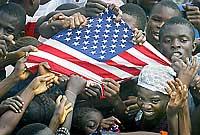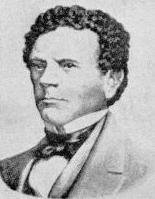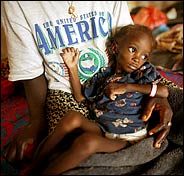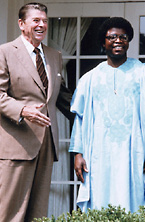| (insert your NIE or newspaper logo here) |
Weekly Online LessonOnline Lesson ArchiveGrade Level: 8-12
|
Liberia's Quest for Peace
 Over
the last month, stories of Liberia's nationwide humanitarian and security
crises have peppered the newspapers. These accounts were triggered in
June by their civil war's renewed intensity and by President George
W. Bush's proposal to send peacekeeping troops to the West African country
in the near future.
Over
the last month, stories of Liberia's nationwide humanitarian and security
crises have peppered the newspapers. These accounts were triggered in
June by their civil war's renewed intensity and by President George
W. Bush's proposal to send peacekeeping troops to the West African country
in the near future.
Disagreements and power struggles between various social, political and religious factions have been tearing this nation apart for decades. The recent escalation has resulted in hundreds of civilian deaths, and hundreds of thousands more have fled their homes. Most residents are desperate for food, clean water, medical care and general safety.
Last week, on Tuesday, July 9, 2003, President Bush sent a 32-man assessment team to Liberia. The team is expected to ascertain the country's conditions, which may be followed by the arrival of a 2,000-person peacekeeping force and the departure of the Liberian president, Charles Taylor. Troop deployment would mark the first U.S. military intervention in West Africa.
 Unlike
other African nations, Liberia has some strong, direct ties to the United
States. Essentially, this oldest of independent African nations was
founded by freed American black slaves. It's no coincidence, for example,
that Liberia's flag resembles that of the U.S., or that the capital
city of Monrovia was named after U.S. President James Monroe.
Unlike
other African nations, Liberia has some strong, direct ties to the United
States. Essentially, this oldest of independent African nations was
founded by freed American black slaves. It's no coincidence, for example,
that Liberia's flag resembles that of the U.S., or that the capital
city of Monrovia was named after U.S. President James Monroe.
In this week's lesson, you'll uncover the shifting relationship between Liberia and the U.S. You'll also find out how the area's political and social circumstances have fueled civil war, and think about how the Liberian people, the United States and other allies might be able to bring some lasting peace and stability to this nation.
Liberia Is Born
 Begin
with reviewing Liberia
History at the Friends of Yekepa Network. Check out the
statistics to get an idea of the basic conditions.
Begin
with reviewing Liberia
History at the Friends of Yekepa Network. Check out the
statistics to get an idea of the basic conditions.
What borders Liberia? Why was the area formerly referred to as the Grain Coast? What proportion of residents is younger than age 15? What is the mix of ethnic, religious and language groups within the country?
Lower on the page, read the narrative titled History and Government. What were the conditions in America that gave rise to the idea of repatriation? What was the American Colonization Society (ACS), and what role did it play? Who was in charge of running the infant country and how did that change over time up until 1997?
 Next,
journey to the PBS site, Global
Connections. Destination: Liberia.
Next,
journey to the PBS site, Global
Connections. Destination: Liberia.
Watch the trailer for the film, America's Stepchild, in QuickTime or RealPlayer if you want, then browse the Timeline. Read about this area's historic highlights, from 1200 A.D. to 1820-1900, 1901-1970 and 1971-2000.
How many freed slaves first traveled to West Africa? How did indigenous peoples react to the settlement? Who were some of the main players — inside and outside of the country — that controlled or influenced Liberia over the years? What roles did Charles Taylor, William V.S. Tubman, William R. Tolbert Jr., and Samuel K. Doe play in Liberia's power structure? How many years of relative stability can you identify?
Liberia's Relationships
 Your
next stop is Essays
& Lessons. While reading the essays, you can click
on any underlined keyword for its definition. You can also watch the
Related Videos listed along the left side of the narrative as you go
along.
Your
next stop is Essays
& Lessons. While reading the essays, you can click
on any underlined keyword for its definition. You can also watch the
Related Videos listed along the left side of the narrative as you go
along.
Start with The Story of Liberia, which provides more detail about some of the historical events that shaped this nation. Then read about Liberia and the U.S., which helps explain Liberia's relationship with the United States and with other countries.
What was Liberia's interest in keeping strong ties with the U.S.? How did U.S. interest in Liberia fluctuate over the years? In what ways has each shown support for the other? What other interests sometimes made this relationship tense or insecure, particularly during the Cold War era?
How have human rights fared during Liberia's lifespan? Do you think the U.S. and Liberia's other allies can help construct some long-term stability in the country? Why or why not? How would you go about resolving the conflicts between the various groups of Liberian residents? Which circumstances or conditions would need to change first?
Newspaper Activities
In a current issue of Targetnewspaper, look for news about Liberia. How are Liberians reacting to U.S. involvement? Are conflicts getting worse, better or staying about the same? What's happening with Charles Taylor? What has the United States proposed as a plan for boosting Liberia's government, infrastructure and humanitarian relief? What is the U.S. government's motivation for its proposal? Have any other countries gotten involved in helping Liberia? Why or why not?
© Copyright 2003
Learners Online, Inc.
